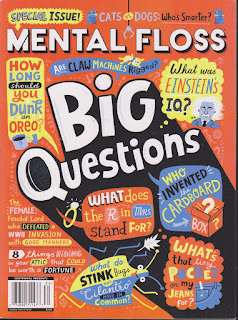 Mental Floss ended its run as a magazine three years ago, confining its product, what might be termed interesting trivia, to its website. This fall, however, they've printed a special edition of Mental Floss, reminding former readers, especially those like me who forget to check the website, what they have been missing. One of its many brief articles is about the value of taking notes on paper, just like we used to do in school.
Mental Floss ended its run as a magazine three years ago, confining its product, what might be termed interesting trivia, to its website. This fall, however, they've printed a special edition of Mental Floss, reminding former readers, especially those like me who forget to check the website, what they have been missing. One of its many brief articles is about the value of taking notes on paper, just like we used to do in school.The writer says "taking handwritten notes can benefit your brain by fostering clearer paths of understanding, increasing your ability to recall key discussion points and inspire ideas that forge new paths."
Handwritten notes, like handwriting itself, are threatened with obsolescence. Even shopping lists are today more likely to be found on phones than sheets of paper. But notes on a phone or iPad aren't quite the same as notes on paper, according to Mental Floss, which uses the phrase "science shows" without actually naming the source of that science. I am willing to believe it, however.
I take notes on index cards with every book I read. Often I don't even have to consult my notes when writing my review, except perhaps to find a page number if I need a direct quote from the book. Or I will review my notes to look for lines, ideas or themes that I may want to write about. Would electronic notes work as well? Perhaps, but that actually seems more cumbersome than a few words written on a card.
As I mentioned recently, I jotted down a few notes when I heard Susan Isaacs talk at a book event in St. Petersburg. Without those notes I would have been lost when trying to write about what she said.
Mental Floss discusses different ways of taking notes, the outline method, for instance, or the mapping method, which is less a list than a diagram. How one takes notes may depend upon how one's mind works. I just jot down key words, then try to organize them afterward in a way that makes sense. When I was a newspaper reporter I often just jotted down words and phrases, except when trying to get few good exact quotes. From these few scraps, which triggered memories of the interview, I could usually put together a story that captured the gist of the interview or speech.
I am all for putting things on paper, which is what I wish Mental Floss would do more often.
No comments:
Post a Comment